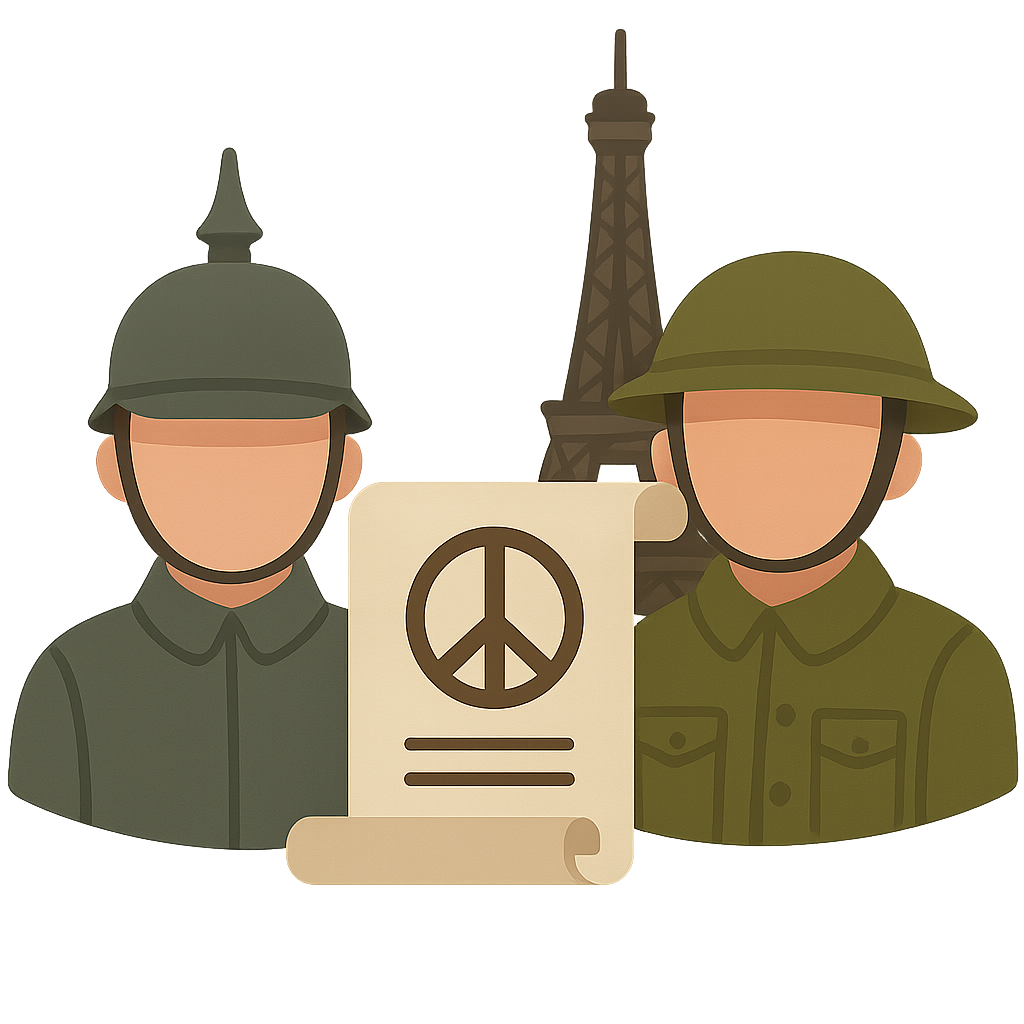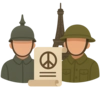A Soldier's Story: The Christmas Truce
My name is Tom, and in the summer of 1914, the very air in Britain seemed to crackle with a nervous energy. I was just a young man, full of dreams and the strength of my youth, when the news that had been rumbling across Europe finally broke like a thunderstorm over our quiet lives. The assassination of a man I’d never heard of, Archduke Franz Ferdinand, in a city called Sarajevo, had somehow lit a fuse that stretched all the way to London. Before we knew it, our King, George V, had declared war on Germany. Suddenly, my village was awash in red, white, and blue. Posters appeared on every wall, featuring a stern-faced man pointing directly at me, with the powerful words, 'Your Country Needs You!'. All my friends were talking about it. We were filled with a powerful sense of duty and patriotism. The older folks in the village spoke of glory and honor, convincing us that this would be a grand adventure. We truly believed the war would be a short, exciting affair. We’d go to France, show the enemy what British spirit was made of, and be home in time to eat Christmas pudding with our families. The idea of being a hero, of fighting for king and country, was an irresistible call to adventure, and I signed my name on the enlistment papers without a second thought.
That initial excitement faded the moment our boots sank into the soil of the Western Front in France. The journey over had been loud with patriotic songs, but as we marched toward the front lines, a grim silence fell over us. The green countryside I knew from home was gone, replaced by a nightmarish landscape of mud, skeletal trees, and water-filled craters that scarred the earth as far as the eye could see. And then we saw the trenches. They were not just ditches; they were a vast, sprawling city dug into the earth, a muddy maze that became our entire world. Life there was a relentless battle against the elements as much as the enemy. The mud was a living thing, thick and greedy, clinging to our boots and uniforms, making every step an exhausting effort. The air carried a constant, deep rumble from the artillery miles away, a sound that shook the ground and settled deep in your bones. It was the permanent soundtrack to our lives, a reminder of the danger that was always present. Yet, in the middle of all that darkness and fear, something remarkable grew. The men I served with—strangers from all corners of Britain—became my brothers. We relied on each other for everything. We shared our meager rations, read letters from home aloud to one another, and told jokes to keep the creeping despair at bay. A lad named Arthur, who had the quickest wit I’d ever known, could make us laugh even on the worst days. Another, a quiet farmer’s son named Sam, had a steady calm that helped us all feel a little braver. These bonds of friendship were the only warmth we had in the cold, damp trenches, and they were stronger than any wall of sandbags.
As December deepened, the cold became bitter and a longing for home grew into a physical ache. Christmas Eve felt particularly strange. As we huddled in our trench, the distant rumble of guns quieted, and an eerie silence fell over the front. Then, through the crisp night air, a sound drifted across the desolate stretch of land between the trenches, the place we called 'No Man's Land'. It was singing. We listened, stunned, as the German soldiers in the trenches opposite ours sang a beautiful carol, 'Stille Nacht'. I recognized the tune as 'Silent Night'. At first, we were suspicious, thinking it was some kind of trick. But their voices were so heartfelt, so full of the same homesickness we felt, that soon one of our own men, a Welshman with a fine tenor voice, began to sing back. On Christmas morning, the unbelievable happened. A single German soldier climbed out of his trench, his hands held high to show he was unarmed. Then another followed. Our own captain, after a moment's hesitation, gave a nod, and we cautiously pulled ourselves over the top of our trench. We met them in the middle of the frozen, broken field. We couldn't understand each other’s language, but the smiles on our faces said everything. We shook hands with the men we had been trying to kill just days before. We exchanged small gifts—I traded a bar of army chocolate for a shiny brass button from a young German’s uniform. He looked no older than I was. Someone produced a worn leather football, and soon a chaotic, joyous game was underway right there in No Man’s Land. For one magical day, we weren't enemies. We were just men, united by our shared humanity.
The truce, that beautiful moment of peace, could not last. The orders came down from the generals, and the war machine, which had paused for a breath, roared back to life. The fighting resumed, and that Christmas Day felt like a distant dream. The war did not end that year, or the next. It raged on for four long, brutal years, stealing the lives of many of the friends I had made in those trenches. Finally, on the eleventh hour of the eleventh day of the eleventh month in 1918, the guns fell silent for good. A stillness descended on the Western Front, so profound it was almost deafening. The war was over. The feeling wasn't the triumphant joy I had imagined back in 1914. It was a deep, weary relief mixed with an overwhelming sadness for all who were lost. Returning home, I was a different person from the boy who had eagerly sought adventure. The war taught me unforgettable lessons about courage and the strength of friendship in the darkest of times. But most of all, it taught me that peace is the most precious thing in the world, and that the shared humanity I witnessed on that Christmas Day is something worth fighting to protect, not with guns, but with understanding and kindness. We must remember the past, not for its glory, but for its lessons, so we can build a more peaceful future.
Reading Comprehension Questions
Click to see answer



